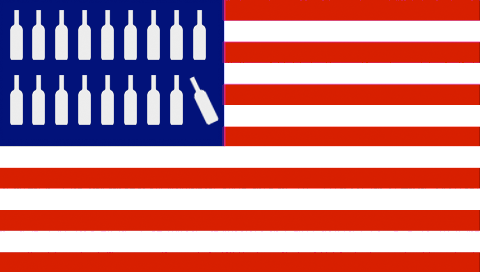
Shanghai-based Simon Su has imported Santa Barbara brands Dierberg and Star Lane for nearly a decade—and has a lot to say about the three Chinese tariffs levied on U.S. wines these past 15 months. I included his key points in this Wine Searcher story and posted an extended version of his comments below.
On the trio of tariffs
“With the first and second tariffs, some wineries provided discounts to help importers survive. That was okay, especially for fine wine. But for the third tariff, effective June 1, this is very serious.”
“This means if the importers don’t increase prices now, they will make zero money. You can calculate the total of the three tariffs. Importers in China have no room to make money at all if they focus on wholesale.”
[This is based on importers selling wine at ~50 percent over the cost of buying the wine, shipping, Customs et al. Tariff hikes of 15, 15 and 10 percent essentially consume that.]
On different kinds of clients
Su says 30 percent of his sales are to upscale restaurants and five-star hotels. “For this portion, we cannot increase the price, so we just break even. We continue to sell but we don’t make any money. Strategically, we want to keep this customer base. Hopefully, we can withstand this situation for one year or two. Hopefully we can see improvement and progress between [US President Donald] Trump and [China President] Xi [Jinping].”
Fifty percent of Su’s clients are private. A typical one is a factory owner who needs wine to entertain guests and has bought from Su for years. “He’s very loyal to one brand, he doesn’t want to change to another region, I have a lot of these customers. We will increase our prices 15 percent, which is the same percentage as the third tariff. Since most of our clients know the quality of our wines, it makes sense. We just add 15 percent. We told them if the trade war ends, we will decrease this. Normally all of them can accept this. That’s how we can survive and make some slight profit. These sales subsidize the 30 percent of clients where we break even or lose money.”
Finally, 20 percent of Su’s sales are via distributors around the country. “Right now, we lost almost all of them. They don’t want to increase costs and it’s harder to sell American wine.” He cites two reasons. “First, their customers know American wine is not competitive now. Second, people have a mood, they think Trump made trouble for China, and they don’t want to buy that commodity.”
On downsizing
“Some importers are considering shipping less than a container. So, one pallet or two pallets, instead of a full container. If they still need to shift some wine to China, that’s what they are considering.”
On wine smuggled from duty-free Hong Kong
“Without a Chinese back label, you can’t sell it in a restaurant or hotel. And the people who help bring this wine into China will charge 20 to 50 percent as labor cost, so it’s not cheap at all. If you want to take Lafite or Burgundy Grand Cru [for private customers], it might be worth doing so, but if you want to sell it in a restaurant or market to compete with other legally imported wines, you shouldn’t do it.”
On his overall sentiment
“I’m not optimistic. I don’t think the trade war is just about the trade imbalance, It’s related to politics and the military and I think it will last a very long time. Probably there will some commodities with temporary [tariff] decreases, but long-term developments will not be easy.” And if it does last a long time, and the U.S. doesn’t come to an agreement with China?
“If they don’t care, we also don’t care. If someday we aren’t making any money, then we will find another country’s wine.”
Read the full Wine Searcher piece here.
Grape Wall has no sponsors of advertisers: if you find the content and projects like World Marselan Day worthwhile, please help cover the costs via PayPal, WeChat or Alipay.
Sign up for the free Grape Wall newsletter here. Follow Grape Wall on LinkedIn, Instagram, Facebook and Twitter. And contact Grape Wall via grapewallofchina (at) gmail.com.

Leave a Reply
You must be logged in to post a comment.